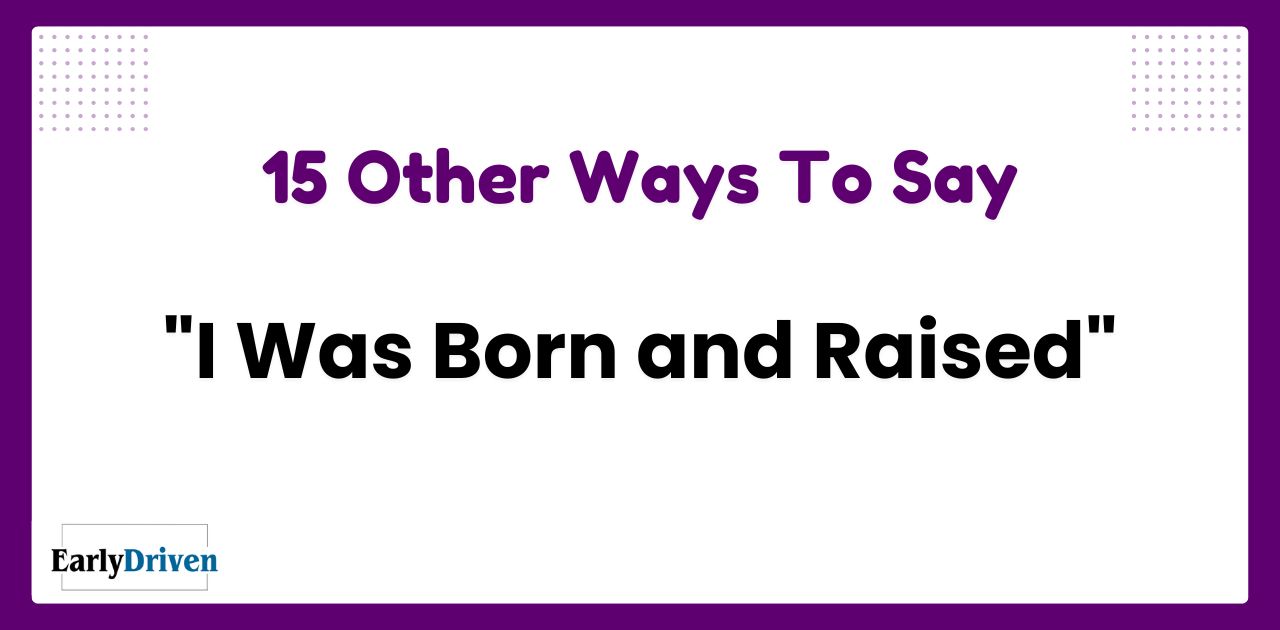Looking for sophisticated alternatives to express your origins? Whether you’re crafting a professional biography, preparing for a job interview, or engaging in business correspondence, the way you communicate your background matters significantly.
This comprehensive guide presents fifteen refined alternatives to the common phrase “I was born and raised,” helping you articulate your origins with precision and professionalism.
From formal expressions suitable for executive presentations to elegant phrases for networking events, these alternatives will enhance your communication toolkit and help you make meaningful connections in any professional setting.
Understanding the Purpose of Ways to Say “I Was Born and Raised”
In today’s interconnected world, expressing our roots and identity has become increasingly important in both personal and professional contexts. The traditional phrase “I was born and raised” serves a fundamental purpose in communicating our origins, but various situations call for more nuanced expressions that can better convey our cultural heritage and personal history.
The way we express our origins can significantly impact how others perceive us and understand our background. Whether in job interviews, professional networking events, or cultural exchanges, having a diverse repertoire of phrases to express our origins helps us communicate more effectively and build meaningful connections.
Other Ways to Say “I Was Born and Raised”
- Native Of
- From My Roots
- Origin In
- Inhabited From
- Brought Up In
- Grew Up In
- Raised In
- Homegrown In
- Originated In
- Hail From
- Local To
- Heritage Traced To
- Cultural Foundation In
- Established Roots In
- Ancestral Base In
- Indigenous Connection To
1. Native Of
When expressing formal birthplace expression, “Native of” carries particular weight in professional settings. For example:
Example: “As a native of Boston’s historic North End, I bring deep understanding of the city’s business landscape to this urban development project.”
This phrase effectively communicates both geographical origin and cultural connection, making it particularly valuable in professional biographies and formal introductions.
2. From My Roots
The phrase “From my roots” emphasizes ancestral ties and deep connections to place and culture. Consider this application:
Example: “Coming from my roots in New Orleans’ French Quarter, I’ve developed a unique perspective on preserving historical architecture while embracing modern innovations.”
3. Origin In
Expressing “Origin in” provides a sophisticated way to discuss your regional identity. For instance:
Example: “With my origin in California’s Silicon Valley, I witnessed firsthand the evolution of tech startups into global enterprises.”
4. Inhabited From
This phrase emphasizes long-term community background and belonging:
Example: “Having inhabited from Seattle’s diverse University District since childhood, I’ve experienced its transformation into a global innovation hub.”
5. Brought Up In
“Brought up in” emphasizes upbringing influences and environmental factors:
Example: “I was brought up in Portland’s artistic community, where sustainable living and creative expression shaped my professional approach to environmental design.”
6. Grew Up In
This phrase naturally incorporates both location and temporal aspects of your background:
Example: “I grew up in Chicago’s South Side, where the strong sense of community and entrepreneurial spirit influenced my business philosophy.”
7. Raised In
When discussing your formative years and local connection, “Raised in” offers a perfect balance:
Example: “Being raised in Miami’s multicultural environment provided me with unique insights into international business relations.”
8. Homegrown In
“Homegrown in” emphasizes authentic hometown pride and deep local knowledge:
Example: “As someone homegrown in Austin’s tech corridor, I understand both the traditional values and innovative spirit that define our business community.”
9. Originated In
This formal expression works well in professional contexts while maintaining personal connection:
Example: “Having originated in the Rocky Mountain region, I bring a unique perspective to environmental conservation projects.”
Read Also: 15 Other Ways to Say “In Loving Memory”
10. Hail From
“Hail from” offers a slightly more casual yet professional way to express origins:
Example: “I hail from Minnesota’s Twin Cities, where my experience in urban planning began.”
11. Local To
Emphasizing community background and current presence:
Example: “As someone local to the San Francisco Bay Area, I’ve witnessed the evolution of sustainable architecture in urban spaces.”
12. Heritage Traced To
This formal expression elegantly conveys family traditions and historical connections:
Example: “My heritage is traced to the coastal regions of Maine, where generations of maritime expertise have shaped our family’s business acumen.”
This phrase particularly resonates in contexts where ancestral knowledge and traditional practices hold significance.
13. Cultural Foundation In
When emphasizing cultural heritage and formative influences:
Example: “With my cultural foundation in Philadelphia’s historic district, I’ve developed a deep appreciation for preserving architectural heritage while embracing urban innovation.”
This alternative effectively communicates both cultural identity and professional perspective.
14. Established Roots In
This phrase emphasizes deep local connection and community engagement:
Example: “Having established roots in Denver’s entrepreneurial community, I bring both traditional values and innovative approaches to business development projects.”
15. Ancestral Base In
For situations requiring emphasis on ancestral ties and historical context:
Example: “My ancestral base in Charleston’s historical district has provided unique insights into sustainable preservation practices and community development.”
Indigenous Connection To
When expressing deep-rooted regional identity and historical presence:
Example: “My indigenous connection to the Pacific Northwest has informed my approach to sustainable resource management and community engagement.”
Best Practices for Professional Usage
- Match formality to context
- Be specific about geographical locations when relevant
- Highlight cultural connections when appropriate
- Consider your audience’s familiarity with regional references
- Maintain consistency in professional documentation
FAQ’s
Q: Is it correct to say “born and raised”?
A: Yes, “born and raised” is a grammatically correct and widely accepted phrase used to express both your birthplace and where you grew up. However, professional contexts may call for more formal alternatives.
Q: What does being born and raised mean?
A: Being “born and raised” indicates that a person was both born in and spent their formative years in a particular location, suggesting deep roots and cultural connection to that place. It encompasses both physical origin and developmental upbringing.
Q: How do I say I was born and raised professionally?
A: Professional alternatives include “native of,” “originated from,” or “cultural origins in.” For example, “As a native of Boston” or “My cultural origins lie in the Pacific Northwest” offer more refined ways to express your background in formal settings.
Q: What is the difference between raised and brought up?
A: While both terms convey similar meanings, “raised” is more commonly used in American English, while “brought up” is more prevalent in British English. Both refer to the process of being nurtured and educated during childhood, though “brought up” often carries a slightly more formal tone.
Q: How do you say “born and brought up” formally?
A: For formal communication, you can use phrases like “I am a native of [place],” “My origins trace to [location],” or “I have my cultural foundation in [area].” These alternatives maintain professionalism while conveying the same information.
Q: What’s the distinction between “I was born” and “I am born”?
A: “I was born” is the correct form for expressing birth as a past event. “I am born” is grammatically incorrect in standard English, as birth is a one-time historical event that should be expressed in the past tense.
Q: How can I express my birthplace and upbringing in business contexts?
A: In business settings, use phrases like “I am a native of,” “My professional foundations were established in,” or “My heritage traces to.” These alternatives maintain professionalism while effectively communicating your background.
Q: Which phrase is most appropriate for formal business settings?
A: “Native of” and “Originated in” are particularly well-suited for formal business contexts.
Q: How can I emphasize cultural connections?
A: Phrases like “From my roots” and “Cultural origins in” effectively highlight cultural aspects.
Q: When should I use more casual expressions?
A: Terms like “Hail from” work well in networking events or less formal professional settings.
Conclusion
The ability to effectively communicate our origins enhances our professional presence and personal connections. These fifteen alternatives to “I was born and raised” provide flexibility in expressing our background while maintaining professionalism. Consider your audience and context when selecting the most appropriate phrase, and remember that your choice of words can significantly impact how others understand and relate to your background.
Remember that these expressions are more than just alternatives – they’re tools for building meaningful connections and establishing professional credibility. Use them thoughtfully to create authentic connections while maintaining professional standards.
Elevate you English Learning Skills with our Mastery Blogs!

“Smith, At EarlyDriven, our dedicated team of experienced writers and journalists brings you comprehensive coverage across entertainment, celebrity news, and educational content. With expertise in digital media and a commitment to accuracy, we craft engaging stories that inform, educate, and entertain our global readership.










